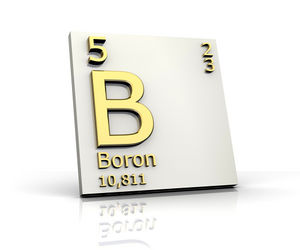Boron
| See Also | Minerals |
|---|
Boron is a trace mineral important for its role in converting vitamin D into its active form. The mineral also appears to be involved in calcium and magnesium metabolism. Furthermore, boron may be important in decreasing body calcium loss by increasing the beneficial effects of estrogen on bone health [1].
Contents
Food Sources
The following foods have the highest concentration of boron. For a more expansive list on food sources of specific nutrients visit Health Canada's Dietary Reference Intakes for Elements or USDA's National Nutrient Database
- Main Dietary Sources: fruits and vegetables (the amount depends on the amount of boron in the soil)
Uses
The following are the primary uses of boron. [1]
- Osteoporosis: It is believed that boron deficiency may actually contribute to the high rates of osteoporosis and menopausal symptoms in American women. Boron has important action in activating vitamin D and estrogen. It may even mimic some of the effects that estrogen has on calcium metabolism.
- Arthritis: Boron supplementation has shown positive results with regards to pain relief in patients with osteoarthritis, juvenile arthritis, and rheumatoid arthritis.
Deficiency Symptoms
Deficiency symptoms may appear in post-menopausal women and may include:
- increased urinary excretion of calcium and magnesium
- depressed serum concentrations of estrogen and testosterone
Excess Symptoms
At extremely high doses, the following symptoms may ensue:
Assessment Procedure
- Hair and urine analysis. [2]
Prescribing Considerations
- For general health and osteoporosis - sodium borate and boron chelates
- For treatment of arthritis - sodium tetraborate decahydrate [1]
- The recommended dosages varies based on age and health status. To determine what your specific requirements are talk to your naturopathic doctor or other trained medical professional.
There is no RDA for boron. A daily intake of 1.5-3.0mg is safe and probably more than adequate.
Safety
- Children: Children exposed to boron-containing dusting powders and lotions (especially in the forms borax and boric acid), contribute to a high number of toxicity reports. Irritation is common especially when applied to broken skin and mucous membranes. It is best to avoid these products in children and infants.
- Adults: generally regared as safe
- Seniors: generally regarded as safe
- Pregnancy and Breastfeeding: Sufficient reports are not available to provide adequate evidence to confirm the safety of boron in pregnancy and nursing. It is best to avoid supplementation due to potential effects on estrogen metabolism.
- Precautions: Individuals with rheumatoid arthritis might experience an aggravation of their symptoms when supplementing with boron during the initial 1-3 weeks. Increases in estrogen also occur and may increase risk of some kinds of cancers although no epidemiological studies have confirmed this. Menopausal women experiencing hot flashes and supplementing with boron may experience a decrease in symptoms if supplementation is discontinued.
Drug Interactions
- Drug Interactions include:[3]
- Hormone Replacement Therapy (HRT): Estrogen-Containing and Synthetic Estrogen and Progesterone Analog Medications - Co-administration of boron and estrogen enhancement therapies could provide synergistic benefit towards preventing bone demineralization, limiting bone loss, and treating osteoporosis. Concomitant use could also theoretically increase risk of adverse effects of excess estrogen although evidence is not available to confirm this. Encourage increased dietary intake of boron-rich vegetables, fruits, and nuts.
Nutrient Interactions
- Nutrient Interactions include: [3]
- Calcium - Boron exerts a favourable influence on calcium absorption, function, and excretion.
- Copper - Boron appears to increase serum levels of both copper and copper-dependent enzymes in humans. These elevations in copper levels may be a concern.
- Magnesium - Boron supports magnesium function and may assume some of its functions in states of magnesium deficiency especially when severe enough to produce deficiency symptoms.
- Phosphorus - Administration of boron appears to lower serum phosphorus concentrations.
- S-Adenosyl-L-Methionine (SAMe) - Concomitant use of boron and SAMe may help to relieve painful arthritic symptoms associated with osteoarthritis.
- Vitamin B2 - High doses of boron may increase excretion of vitamin B2.
- Vitamin D - Boron appears to play a role in converting vitamin D to its more active form, thus facilitating calcium absorption.
References
- ↑ 1.0 1.1 1.2 Murray Michael T 92005) Encyclopedia of Nutritional Supplements, The Essential Guide for Improving Your Health Naturally, Prima Publishing
- ↑ Bralley J Alexander and Lord Richard S (2005) Laboratory Evaluations in Molecular Medicine, Nutrients, Toxicants, and Cell Regulators Institute for Advances in Molecular Medince, GA
- ↑ 3.0 3.1 Stargrove Mitchell Bebell, Treasure Jonathan, McKee Dwight L (2008) Herb, Nutrient, and Drug Interactions, Clinical Implications and Therapeutic Strategies. Mosby

